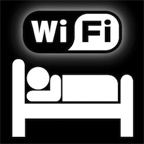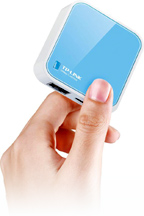Wednesday 14 January, 2015, 12:52 - Spectrum Management
Posted by Administrator
Back in October of last year, Wireless Waffle reported that Marriott hotels had been fined by the FCC for deliberately interfereing with Wi-Fi networks in an attempt to try and force guests at their hotels to use the hotel's own extortionately priced WiFi service.Posted by Administrator
 Earlier this month, the New York Times reported that several hotel chains have petitioned the FCC for permission to legally undertake such activities. The lengthy petition argues on several points that hotel operators (and other landlords) should be able to manage their networks to the extent that they can identify, and neutralise, anyone trying to offer WiFi services other than themselves, thereby maintaining a quality of service and level of security and safety for their users.
Earlier this month, the New York Times reported that several hotel chains have petitioned the FCC for permission to legally undertake such activities. The lengthy petition argues on several points that hotel operators (and other landlords) should be able to manage their networks to the extent that they can identify, and neutralise, anyone trying to offer WiFi services other than themselves, thereby maintaining a quality of service and level of security and safety for their users.The main tenets of their argumentation seem to be:
- That the type of sophisticated monitoring and enforcement activities they are proposing do not constitute harmful interference but are good network management practices;
- That their networks are established using best industry practices to maximuse performance and that non-approved WiFi hotspots mess about with this and degrade their service;
- That the Part 15 rules that allow users to establish WiFi hotspots require those users to be located on a property where the user has "direct or indirect ownership or leasehold" and that this does not apply to hotel guests.
It then goes on to liken a university applying bandwidth caps to student usage as being a similar network management practice, but one that no-one would argue with and therefore, by implication, the practice of neutralising the threat of miscreant networks should also just be considered best practice.
 Notwithstanding any of the above, WiFi networks, whether operating under the Part 15 rules in the USA, or in most other countries are permitted access to the radio spectrum on a 'non interference' basis. This means that they are not permitted to interfere with any other users, and that they must accept any interference caused by any other users. In effect, they have no protection from interference at all. What the hotels are trying to do is run a commercial grade wireless internet service in this spectrum. If this were possible, and it were possible to provide the quality of service that users would seek, would it not follow that the big commercial operators would want to do the same thing too. Free WiFi hotspots in a coffee shop is one thing, but trying to provide a guaranteed service is another.
Notwithstanding any of the above, WiFi networks, whether operating under the Part 15 rules in the USA, or in most other countries are permitted access to the radio spectrum on a 'non interference' basis. This means that they are not permitted to interfere with any other users, and that they must accept any interference caused by any other users. In effect, they have no protection from interference at all. What the hotels are trying to do is run a commercial grade wireless internet service in this spectrum. If this were possible, and it were possible to provide the quality of service that users would seek, would it not follow that the big commercial operators would want to do the same thing too. Free WiFi hotspots in a coffee shop is one thing, but trying to provide a guaranteed service is another. The hotel chains argue that when they enter into an agreement to provide services for, for example, a conference, they agree to some quality of service parameters for their WiFi service. This is their own silly fault! It's like guaranteeing your guests that it won't rain this week. It's not something that the hotel has control over. Not least, the WiFi bands are used by a myriad of other, non-WiFi devices, that could equally upset the performance of the hotel's WiFi networks including their very own microwave ovens!
The hotel chains argue that when they enter into an agreement to provide services for, for example, a conference, they agree to some quality of service parameters for their WiFi service. This is their own silly fault! It's like guaranteeing your guests that it won't rain this week. It's not something that the hotel has control over. Not least, the WiFi bands are used by a myriad of other, non-WiFi devices, that could equally upset the performance of the hotel's WiFi networks including their very own microwave ovens!One has to question whether these hotels would be so keen to conduct such complex network management if they offered their WiFi service for free. Hotel visitors should vote with their feet and choose hotels that do offer Free WiFi. Marriott and its friends would soon change their tune, not least as it appears that cheaper hotels have the best WiFi! Oh, and don't forget to take your Wireless Nano Router to set up your own network nice and easily too!
Post Script: It seems that just a day after writing this, the BBC report that Marriott has backed down. Was it something we said...?
add comment
( 378 views )
| permalink
| 



 ( 2.9 / 1601 )
( 2.9 / 1601 )




 ( 2.9 / 1601 )
( 2.9 / 1601 )

